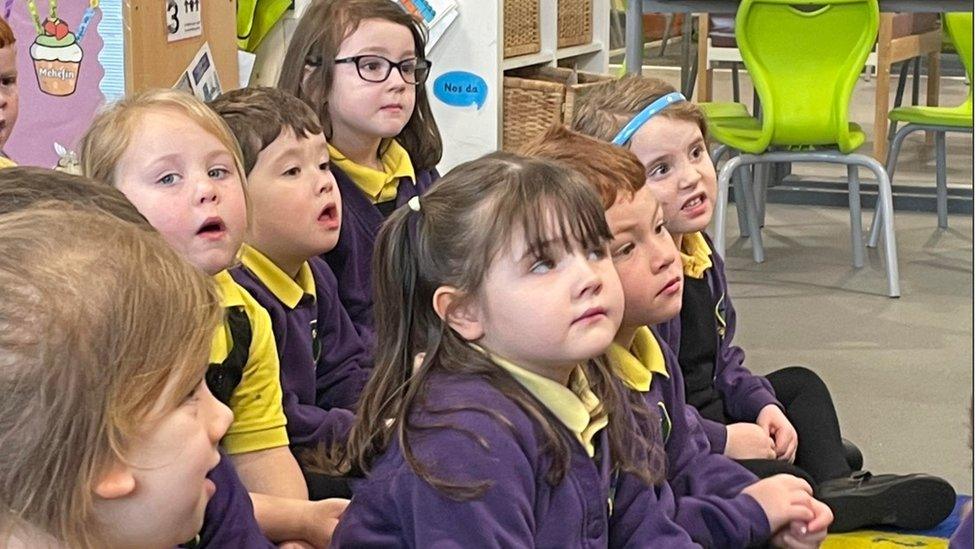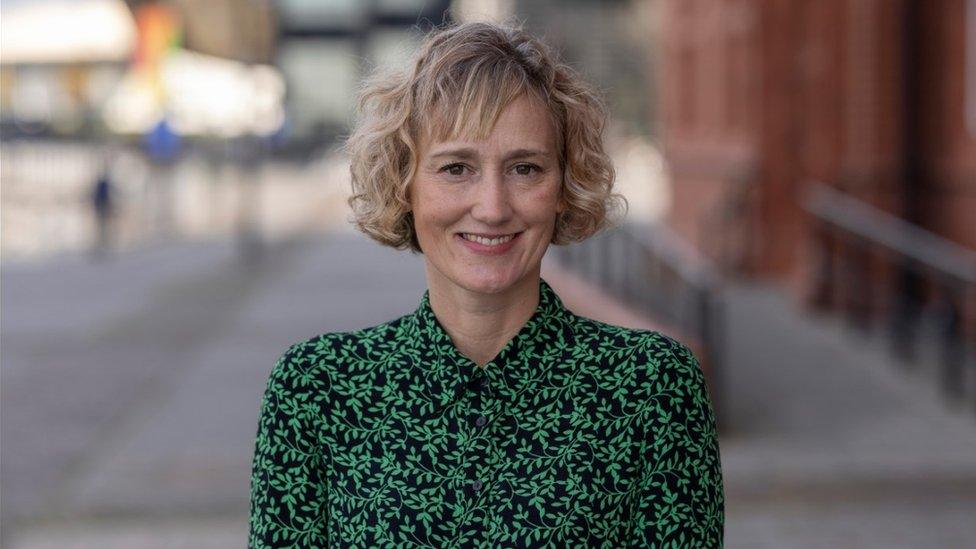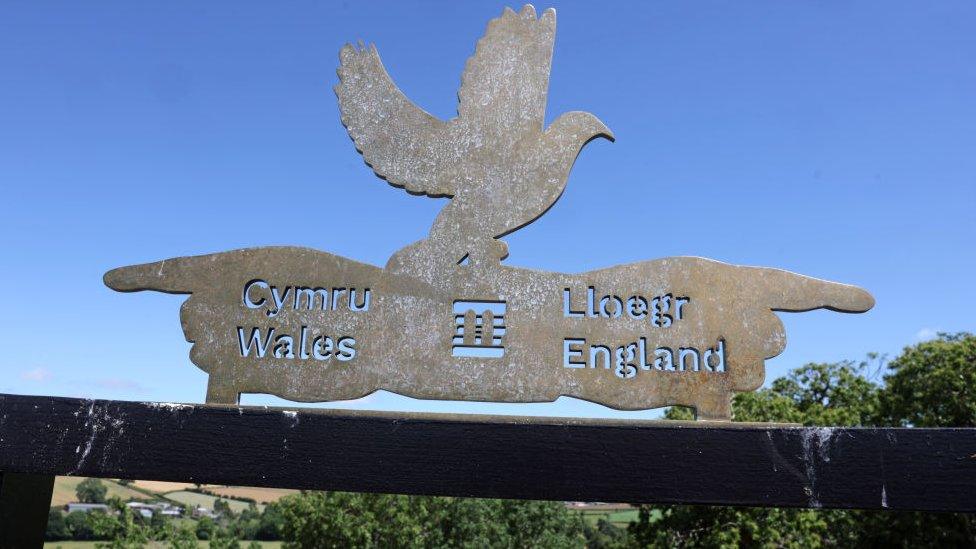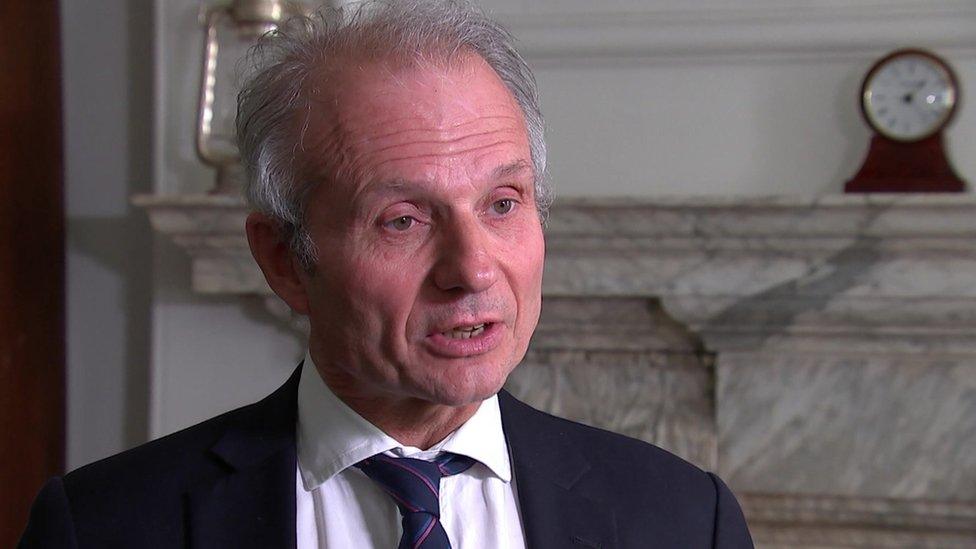Welsh: Covid lockdowns blamed for drop in speakers
- Published

Pupils from Ysgol Bro Teifi say they see more English spoken among younger pupils since the pandemic
Covid lockdowns have been partly blamed for a drop in young Welsh speakers, who were not able to use the language regularly for two years.
The 2021 census showed a 5.7% drop in the number of school-age children able to speak Welsh since 2011.
This is despite the number of pupils in Welsh-medium education rising by 11,000 in that period.
Students in a Welsh-speaking heartland said Covid may have hit the confidence of some to use it socially.
The Welsh government has ambitious plans to increase the number of speakers to one million by 2050 - with 562,000 reporting they could speak it in 2011, dropping to 538,000 in 2021 (17.8% of the population).
In 2011, 168,000 school-age children were recorded as being able to speak Welsh, which fell to 146,000 in 2021.
This is despite the number of pupils in schools where Welsh is taught as a first language rising from 85,325 to 95,120, with many others in bilingual schools.
With lockdowns and learning from home in place as the country battled Covid between March 2020 and December 2021 - when census data was collected - government officials said this could have affected parents' confidence in classing children as Welsh-speaking.
"Children were out of school and it may be that we are seeing this concern reflected in the way they reported their children's ability in Welsh," a Welsh government spokesman said.

A new immersion unit is introducing older children to Welsh-medium education in Torfaen
Ysgol Bro Teifi in Llandysul, Ceredigion, has seen sixth-form numbers increase from 750 in 2016 to more than 900, but pupils said the pandemic has had an impact on language confidence.
"I barely speak English at home or in school, but I've seen a decrease maybe around in the community since Covid and people have maybe lost the confidence to speak Welsh," Jano,16, said.
Osian, 17, agreed, saying he had seen younger pupils speaking more English.
This is because those from English-speaking families had "not really had the opportunity over the last two years because of Covid to use the Welsh language", he believes.
Despite this, Tomos, 17, said he was confident for the future: "There are many more pupils in this school than when it started which shows that people want their children to have their education through the Welsh language."
Annie, 16, agreed - her mother is not a Welsh speaker, but she said children "do pick it up".
Dr Rhian Hodges, a sociology lecturer at Bangor University said Welsh-medium education needed to be "accessible to everyone".
"There is a general sense of disappointment and of maybe shock initially when we look at this paradox between the decreases and the numbers attending Welsh medium education," she added.

The Welsh language commissioner believes all parents should have a choice in sending children to Welsh-medium schools
First Minister Mark Drakeford has written to the Office for National Statistics (ONS), which compiles the census data, to ask officials to look at why different surveys about Welsh produce different results.
Welsh language commissioner Efa Gruffudd Jones said Welsh in all schools should be offered "better and more efficiently".
In Torfaen a new language immersion unit - the first in the county - is about to open at Ysgol Panteg, Pontypool.
It will allow seven to 11-year-olds to have intensive Welsh lessons for 12 weeks before moving into mainstream Welsh-medium classes.
Head teacher Dr Matthew Dicken said it would offer another chance for parents to introduce their children to Welsh-medium education.
He added that the aim was to "show the opportunities that come with Welsh education and to really give people the opportunity to take that up in so many different ways".
The Welsh government said: "More children in English-medium schools are learning Welsh through our curriculum for Wales and we've approved plans to increase Welsh in education in the next 10 years with all local authorities.
"The census is one of many important pieces of data that will be used to consider what changes need to be made in future to ensure our language thrives."
- Published6 December 2022

- Published1 July 2019

- Published19 January 2023
